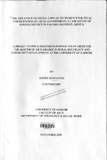| dc.description.abstract | The research site is former Mwingi district covering the areas of jurisdiction of Mwingi Town and County Councils. The former Mwingi district, currently sub-divided into several districts was one of the 13 districts in Eastern Province. It borders Kitui district to the south, Machakos district to the west, Mbeere and Meru south district to the north and Tana River district to the east. Mwingi is classified as a semi-arid district covering 10,030.30 square Kilometers.
The district has high incidences of poverty estimated at 60% and is characterized by erratic rainfall ranging between 400-800mm per year. As a result, there is over reliance on relief food for survival. The district has a total of3,000 registered women groups and a population of 303,828 people. Mwingi has two local authorities namely: Mwingi County Council with 28 wards and Mwingi Town Council with 6 wards. The district has nine administrative divisions namely: Central, Migwani, Kyuso, Nuu, Ngomeni, Nguni, Mui, Mumoni and Tseikuru (Mwingi District Development Plan, 2002-2008).
This study was designed to investigate the influence of social capital on women's political participation in Local Government in Kenya. Specifically, the study had the following objectives:
1. To determine the level of political participation of women civic candidates in Mwingi
2. To establish the characteristics of women in Mwingi District
3. To investigate the characteristics of women groups in Mwingi
4. To investigate how social capital (group membership) facilitates members' political participation
5. To establish whether the individual or group characteristics influence women's political participation
6. To establish whether there is a rural-urban distinction in women's social capital.
Data for the study was collected from three divisions of Mwingi District namely: Migwani, Central and Nuu. The study was exploratory and heavily relied on purposive sampling techniques to select the sample. This technique resulted in a sample size of 42 respondents distributed as follows: 12 women civic candidates (6 councillors and 6 contestants who did not succeed through civic elections) and 30 women group leaders. We interviewed 17 key informants who included: 3 chiefs, 3 NGO representatives, 6 male councilors, 2 officers from Mwingi Town and county councils, District Gender, Children and Social Development Officer and two religious leaders and 4 Focus Group Discussions consisting of each 8 participants.
Both primary and secondary sources of data were collected.
Secondary data were obtained from reports, project files, registers, certificates, books and past research. Primary data were collected using 2 types of questionnaires (Women Civic Candidates and Women Group Leaders), Focus Group Discussion and Key Informant Interview Guides. The data collected were on the group and individual women characteristics. Group characteristics include information such as: age, size, number and group activities, type of support for the group members, membership structure, location of the group, sources of funding, relations with political parties and political discourse. Individual women characteristics include information such as: age, marital status, religion, level of education, economic status, group membership, group leadership, number of groups and relations with political parties. The research type and analysis employed both qualitative and quantitative methods. Descriptive statistics was widely used in data analysis.
The study found out that some characteristics of individual women candidates exert more influence on their participation than others. Such includes the level of education, which had both positive and negative influence depending with the overall literacy levels of the population, previous occupation, economic status, group leadership and political party affiliation. Group characteristics too played an important role in influencing participation of women.
Among the important group characteristics included: the group membership structure, size, activities, sources of funding, age of group political discourse and relations with political parties. In conclusion, the study reaffirms that a combination of individual women qualities and group characteristics positively or negatively influence participation of women in local government. | en_US |

